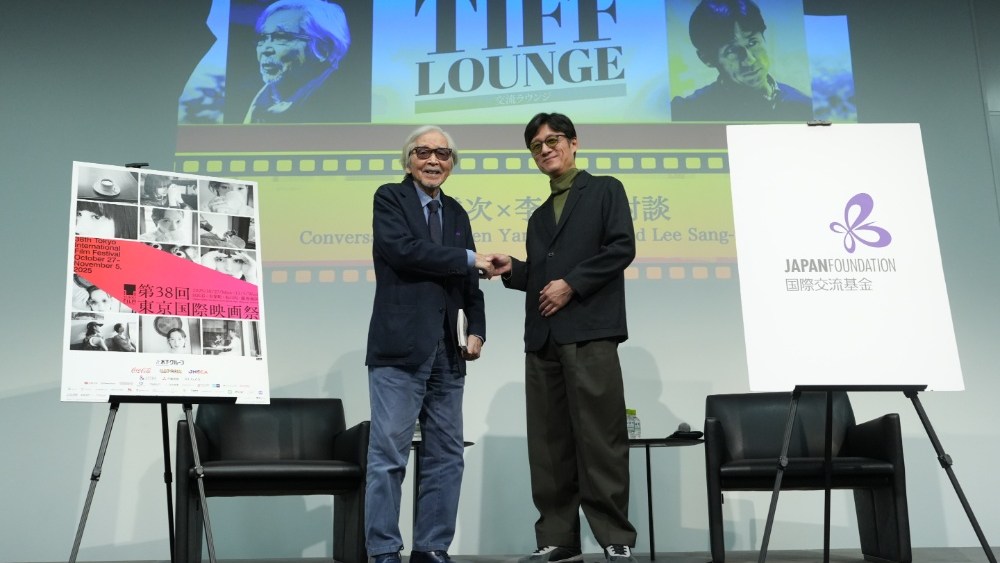A series of talks and masterclasses in the TIFF Lounge at the Tokyo International Film Festival featured a conversation between Yoji Yamada, director of the festival’s centerpiece “Tokyo Taxi,” and Lee Sang-il, winner of this year’s Akira Kurosawa Award for the film “Kokuho.”
Mr. Yamada, 94, whose long filmography includes the iconic 48-episode “Tora-san” series that aired from 1969 to 1995, and Mr. Lee, 51, whose “National Treasure” has been a record-breaking hit since its release in June of this year, earning more than $100 million, expressed their admiration for each other’s work. Mr. Lee called Mr. Yamada a “national treasure” (the English translation of “national treasure”), while Mr. Yamada said it was “embarrassing” to put his low-budget “Tokyo Taxi” next to Mr. Lee’s lavish Kabuki play and said he was there to “watch and learn.”
Director Yamada pointed out that “National Treasure” is “a story of two men” who become kabuki onnagata or onnagata, and said that director Lee’s film is “extremely good because it is different from typical male friendship movies,” and that the focus is on the two main characters, their struggles with art, and their bitter rivals as artists. “Usually in movies like this, there’s always a woman involved between[the two men]so it creates a simple relationship dynamic,” Yamada said. “This movie is not that kind of movie…I was surprised that they were able to express something so complex so well.”
Director Yamada compared the film to the 1984 Mozart biopic Amadeus, where he said, “There was jealousy[between the two main characters]and they were sabotaging and deceiving each other.” Speaking about “National Treasure,” he said, “I thought it would be like that, but at the heart of the drama is “art.” Above all else, I put all my energy into performing.” He also expressed surprise that the two lead actors were fully living their female roles on stage. “How did they pull it off?” he asked.
Lee answered that he spent a year and a half studying Kabuki from scratch to prepare for the co-starring of Ryo Yoshizawa and Ryusei Yokohama. “Honestly, for the first few months, I went to observe it from time to time, but it gave me a headache,” Lee said. “I doubted whether they would get it…But the rehearsal process, where they encouraged each other to improve, directly shaped the relationship between their characters.”
The two directors also discussed veteran dancer and actor Min Tanaka. Min Tanaka played an aging Kabuki female performer in Kokuho and played the sword-wielding antagonist of the main character’s samurai in Yamada’s 2002 Oscar-nominated hit Twilight Samurai.
Mr. Yamada said, “His face and voice were both good.” “But his acting…he was really bad. We rehearsed everything, everything. But it just didn’t work. So we had to dig into[the dialogue]word for word.”
Director Yamada mentioned that Tanaka had become a sought-after actor after the movie became a hit, and said, “I watch him from time to time, but he hasn’t grown at all,” eliciting laughter from the audience.
Lee countered that Tanaka had a dancer-like presence that was perfect for the role, saying, “He’s just there, right? That presence and the way he moves his body. He has a unique way of moving his body, and when you combine that with his voice, it creates this magical presence.”
The topic of discussion was “Tokyo Taxi,” director Yamada’s remake of the 2022 French-Belgian co-production drama “Driving Madeleine.” Chieko Baisho, who frequently co-stars with Yamada, plays an old woman who asks a taxi driver (former pop star Takuya Kimura) to give her a ride to a memorable place in her life in Tokyo before arriving at a nursing home in Yokohama where she plans to spend her remaining days.
Director Yamada commented that Kimura, who starred in the 2006 historical drama “Love and Honor,” was as serious as a taxi driver who mixes natto with his breakfast rice, just as he was as a samurai in his previous work. “He’s like, ‘I have to do this properly and seriously. That’s me,'” Yamada said. “And even when his scene is over, he always stays on set until the end…Big stars are usually late or don’t mind[staying until the end]but he never does that.”
When director Lee visited director Yamada’s set, he said that the director was “always right next to the camera, always watching the actors from the closest position.” “Just as a joke, I tried it myself,” he added. “I realized how important that was. It’s incredibly important for the director to be there. That lesson has stayed with me ever since.” He said younger directors tend to look at monitors that are a little further away from the camera. “That’s totally unacceptable,” he said, adding, “If I were an actor, I wouldn’t like that.”
During the Q&A, the directors were asked their opinions on the huge popularity of Japanese animation worldwide, compared to the relatively low international popularity of Japanese live-action films.
Yamada acknowledged that while the profits from Japanese anime are “huge,” the profits from Japanese films are “virtually negligible in comparison.” “It’s very frustrating and sad for us Japanese artists,” he said. “When I started going to movie theaters 70 years ago, Japanese movies were incredibly vibrant and the movie scene was rich. We have to do something. It’s not just our problem, the Japanese government has to take this issue seriously. This is a national issue. Why South Korea? The reason why movies have such amazing power is because Korea is serious about making movies and truly responds to them.That’s why I want Japan to support movies as a national policy.I hope that such efforts will start in Tokyo.

